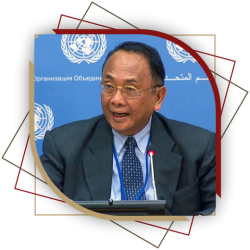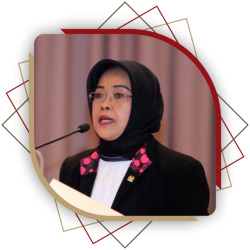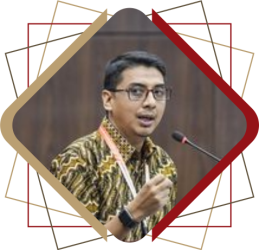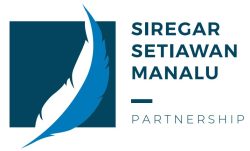THE 2nd INTERNATIONAL POSTGRADUATE STUDENTS CONFERENCE
We are delighted to announce that the Master of Law Study Program, Faculty of Law Universitas Gadjah Mada will host the 2nd International Postgraduate Students Conference with the theme “Legal Challenges and Opportunities in the Field of Human Rights, Democracy, and Social Justice in the Post–pandemic Era“. The conference aims to reflect on legal responses to the pandemic, and invites international academics to respond, critique, and offer solutions. The conference will encourage students, practitioners, and experts to share their responses to challenges faced during the pandemic, especially in the field of legal studies. For law students in particular, participation in this international conference will sharpen critical thinking skills and increase analytical skills through formal discussions and academic writing.
BACKGROUND
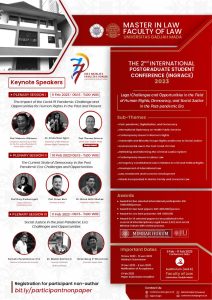 The Covid–19 pandemic has had a significant impact on many aspects of human activity all over the world. On the positive side, the pandemic created many opportunities for the development of technology, enabling innovative forms of indirect human interaction. However, such advancement also creates gaps in the law as progress surpasses legal reform. Over the past few years, many examples of state authorities and others unlawfully using digital surveillance to spy on, intimidate, threaten or silence activists or to locate, detain, or imprison them (Amnesty International, 2018) Nowadays, inequality has becomes more extreme and disparities have increased in social, gender, political, cultural, spatial, environmental, and knowledge spheres as well.
The Covid–19 pandemic has had a significant impact on many aspects of human activity all over the world. On the positive side, the pandemic created many opportunities for the development of technology, enabling innovative forms of indirect human interaction. However, such advancement also creates gaps in the law as progress surpasses legal reform. Over the past few years, many examples of state authorities and others unlawfully using digital surveillance to spy on, intimidate, threaten or silence activists or to locate, detain, or imprison them (Amnesty International, 2018) Nowadays, inequality has becomes more extreme and disparities have increased in social, gender, political, cultural, spatial, environmental, and knowledge spheres as well.
The curtailment of the fundamental rights of millions of people gives rise to disproportionate and unnecessary hardships, amid censorship and surveillance (Chiozza and King, 2022). A lack of guarantees for citizen’s human rights also reveals systemic vulnerabilities, for example in the fields of welfare, health, public services, finance, resilient ecology, decent living and employment, a lack of inclusive governance Leach et al., 2021).
Covid–19 also demonstrated how democracy is imperfectly organized (IDEA, 2021). In the name of the need for emergency action, community involvement is often neglected in the formation of policies. Freedom of expression was the aspect of democracy most at risk prior to the outbreak of the pandemic (IDEA, 2021), as well as the increase in the potential for authoritarianism (Leach, et al., 2021).
The threats and challenges of Covid–19 to social group equality are important to highlight, throughout the process of formulating and implementing policies. Women and other vulnerable groups—such as children, migrants, disabled people, and ethnic, sexual and religious minorities—have faced discrimination in accessing justice across the world, following the enforcement of Covid–19 regulations (IDEA, 2021).
In other hand, massive technological development has thus far not been optimally used to fulfill human rights, democracy, and the enforcement of social justice. The important question to address next, therefore, is whether these conditions will continue into the post–pandemic era. It also worth noting that the pandemic is not a short–term condition: rather it requires people to be able to live alongside Covid–19 with the eventual aim of normalization. In order to create this post–pandemic era, there needs to be in–depth discussion to rethink the paradigm of legal development for the past, present and future (Leach, et al., 2021). Similarly, it is important to evaluate policies and actions that were implemented; what is the right approach in developing regulations on democracy, human rights, and social justice; what changes need to be made to the current underlying legal framework in the post–pandemic period; and what needs to be improved to address future challenges, threats and opportunities.
OBJECTIVES
This conference is aimed:
- Creating a space for dialogue between academics and legal practitioners in the context of reviewing policy formulation and implementation of post-pandemic prevention in various aspects of life, both at local, national, and global levels.
- Formulating and providing recommendations and solutions as a form of evaluation of the handling of the pandemic in order to meet better conditions in the post-pandemic period for human right, democracy and social justice fulfillment.
SPEAKER & PARTICIPANTS
PLENARY SESSION I
The Impact of the Covid-19 Pandemic: Challenges and Opportunities for Human Rights in the Past and Present.
9 February 2023

PLENARY SESSION II
The Current State of Democracy in the post Pandemic Era: Challenges and Opportunities
10 February 2023

PLENARY SESSION III
Social Justice in the post Pandemic Era: Challenges and Opportunities
11 February 2023

The invited international keynote speakers will deliver keynote speeches with different emphases concerning the themes of this conference, according to their respective expertise. Keynote speeches will cover the following topics:
- Current human right enforcement in the post pandemic.
- Covid-19 impact on the environmental side.
- Covid-19 impact on social justice on, specifically on women’s.
- The current state of global democracy in the post-pandemic era and how it has been affected by Covid-19.
- Challenge in the post pandemic era, focusing on how businesses affect human rights.
The conference is open for postgraduate students, researchers, young academics, and practitioners from around the world who are interested in the themes described. Registration will be conducted through our website. The registration fee for offline presence is IDR 750.000 or USD 50 (reguler participant) and IDR 500.000 or 32 USD (UGM affiliates) and for online presence the registration fee is IDR 400.000 or USD 27.
Theme
Legal Challenges and Opportunities in the Field of Human Right, Democracy, and Social Justice in the Post-pandemic Era
Sub Themes
- Post-pandemic, Digitalization, and Democracy
- International Diplomacy on Health Public Services
- Contemporary Issues on Women’s Rights
- Vulnerable and Minority Groups Rights and Access to Social Justice
- Environmental Law in the Post Covid-19 Crisis
- Rethinking and Reforming the Criminal Justice System
- Contemporary Issues in Labour Law
- Emergency Constitutional Law in Relation to Civil and Political Rights
- Development of International Law
- Law, Investment and Economic Development
- Shariah Incorporated in Islamic Family and Economic Law
Opportunities
- Award for five selected international participant: IDR 1.500.000/person.
- Award for two best paper: IDR 1.000.000/person.
- Award for one best presenter: IDR 1.000.000/person.
- Award for 14 selected papers to be published in the Journal of Interdiciplinary Legal Issues (JILI) and Journal Mimbar Hukum with review process.

